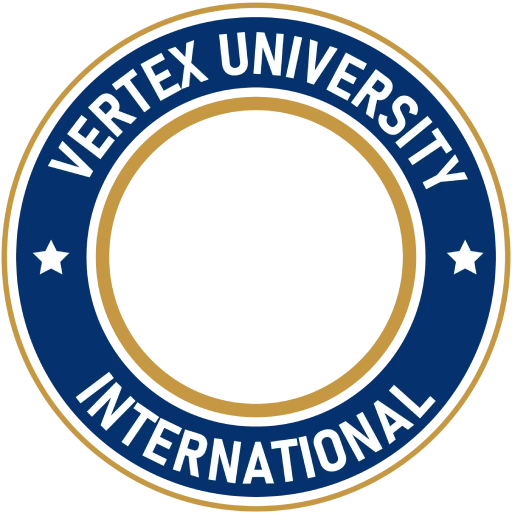Master MSE smart education
With the increasing expansion of the use of digital technology within educational institutions, smart education has become a strategic necessity to develop education systems and improve their efficiency in line with the requirements of the digital age. In this context, the Faculty of E-Learning at Vertex University offers the Master of Smart Education program, which aims to prepare specialists with advanced skills in designing and developing smart learning environments, managing digital educational platforms, and applying artificial intelligence techniques in education. The program focuses on providing students with tools and methodologies that allow them to employ the latest technologies to enhance the learning experience for institutions and learners alike.
The program is based on building a strong knowledge base at the intersections of educational technology and educational sciences. Students learn how to analyze the needs of learners, design flexible and effective educational strategies, and apply modern educational models within smart learning environments. Students also acquire advanced skills in analyzing educational data, investing analysis results in improving the quality of learning and designing adaptive digital content in order to enhance the ability of graduates to lead digital transformation in educational institutions.
The program includes an integrated practical component that allows students to apply theoretical knowledge in realistic contexts through research and applied projects, professional training in designing and evaluating digital content, and building smart learning systems based on advanced technologies. The program also provides specialized training to understand educational policy frameworks, educational quality standards, and digital legislation, ensuring that graduates are qualified to effectively engage in the labor market and keep up with its requirements.
This program is taught by a group of experts and academics specialized in the fields of educational technology and smart education to ensure the provision of renewed and balanced academic content that combines theoretical frameworks and practical application. The learning environment in the program is also characterized by its technological integration, through advanced laboratories and research projects aimed at creating future educational solutions. In addition, students are offered advanced training courses leading to accredited international professional certificates, which enhance their professional competence and competitiveness in the market.
This program opens up broad professional prospects for graduates, including working in jobs such as smart educational designer, digital content developer, educational technology specialist, and e-learning systems manager, as well as job opportunities in universities, educational institutions, technology companies, and research and development centers. The program also qualifies its graduates to establish their own projects in the field of smart educational solutions, allowing them to contribute to reshaping the future of digital education.
Our Vision and Mission
Develop the future of digital education by preparing academic leaders who are able to design smart learning environments, analyze educational data, and apply the latest technologies to support digital transformation in educational institutions globally.
Our Vision
The Master of Smart Education program at Vertex University should be a pioneer in preparing specialists who are able to develop innovative digital learning environments and design smart educational content that supports digital transformation in educational institutions in accordance with international standards.
Our Mission
Qualifying academic leaders with the technical and educational skills needed to design smart educational solutions, analyze educational data, and employ artificial intelligence and virtual reality techniques to enhance the quality of digital learning globally.
- Preparing specialized and qualified staff in designing and implementing interactive digital educational content in accordance with the latest global trends.
- Enhancing students' abilities to employ artificial intelligence techniques to support and develop the educational process in an innovative manner.
- Enable students to manage and operate e-learning systems and platforms efficiently, in line with digital transformations in the education sector.
- Developing students' technical skills in applying virtual reality (VR) and augmented reality (AR) technologies to support modern learning environments.
- Train students to design flexible digital curricula that respond to individual differences and the diversity of learners' learning styles.
- Building the capacity to analyze educational data and use the results of the analysis to improve the quality of education and develop follow-up and evaluation tools.
- Developing scientific research skills in the fields of educational technology and innovation in digital education.
- Developing the educational and communication skills necessary for effective interaction within e-learning environments.
- Establishing the principles of ethical and responsible use of technology within educational contexts, taking into account privacy and digital security issues.
- Qualifying students to work in multidisciplinary teams to plan, develop and implement smart and integrated education projects.
- Enhancing the spirit of innovation and entrepreneurship among students in the fields of e-learning and designing smart solutions.
- Enable students to evaluate the effectiveness of digital educational programs and measure learning outcomes using modern assessment tools.
- Preparing graduates to interact positively with the rapid changes in educational technology at the global level.
- Providing students with the ability to design smart educational strategies that take into account the overall quality standards in digital education.
- Preparing graduates to meet the growing labor market requirements in the fields of smart education, educational technologies, and digital training.
Teaching methods and strategy

case studies
The program integrates real and virtual case studies into different courses, where students interact with multidimensional learning scenarios to analyze educational challenges and propose smart technology-based solutions. These studies focus on analyzing technology applications in realistic educational contexts, evaluating the effectiveness of digital tools, and designing adaptive learning strategies that take into account the diversity of learners' styles. Students are also trained to diagnose the needs of learners in a variety of environments and provide customized and effective educational solutions based on modern educational standards.

Scientific projects
The program enhances students' applied skills through advanced scientific projects in which smart learning systems are designed and developed, innovative educational applications are created, and learning data are analyzed to improve educational outcomes. These projects include designing interactive content, developing digital educational platforms, and applying artificial intelligence techniques in assessment, guidance, and educational decision-making support. The scientific project is an opportunity for students to apply theoretical knowledge in realistic projects and achieve integration between educational and technical aspects.

Teaching strategies
The Master of Smart Education program at Vertex University is based on the diversity of teaching strategies to reflect the evolution of digital education methodologies. It aims to enable students to combine theoretical understanding and practical application in the field of educational technology. The program includes interactive online lectures, as well as virtual labs that simulate modern digital learning environments, allowing students to interact with advanced technologies in an environment that simulates practical reality. Practical case studies based on real learning scenarios are also used to develop analytical, decision-making, and problem solving skills in a digital educational context. The program enhances students' creative abilities by assigning them to design innovative smart educational solutions and provide models that meet the diverse needs of learners and the characteristics of smart learning environments.
What can you do with a Master's degree in Smart Education?
A graduate of the Master of Smart Education has advanced qualifications that qualify him to work in a wide range of specialized jobs that are in high demand in the contemporary digital labor market. These include areas based on designing and developing smart educational solutions, managing e-learning systems, and investing modern technologies in developing the educational process. Examples of these jobs include the following:
The Master of Smart Education from Vertex University is designed specifically for those who seek leadership and those who believe that innovation is the key to the future.
- Smart educational designer
- Education technology specialist
- Educational digital content developer
- Director of E-learning Systems
- Developer of smart educational solutions
- Educational data analyst
- Digital transformation consultant in education
- Researcher in smart education techniques
He acquired advanced skills in designing digital content, analyzing educational data, and applying artificial intelligence in learning environments.
- Educational application programmer
- Teacher trainer on educational techniques
- Director of Digital Education Projects
- VR developer and immersive education
- Digital educational assessment specialist
- E-learning quality consultant
- An entrepreneur in educational technology
Get a consultation
Free now
Do you want to help?
+1 (984) 382-6080
Target group for the Master of Smart Education program

The Master of Smart Education program targets a diverse group of individuals who aspire to develop their skills in designing and applying modern educational technologies, and analyzing educational data to support learning and assessment processes in digital environments. Target groups include the following:
- Students with a bachelor's degree in fields such as educational technology, pedagogy, educational design, or related disciplines, who seek to build an advanced career path in the field of smart education by developing their skills in designing interactive content, managing e-learning platforms, and employing technology to improve learning outcomes.
- Teachers, trainers, curriculum developers, as well as staff in educational development centers and educational institutions who aspire to enhance their abilities to effectively integrate technology into the educational environment and design interactive digital learning strategies based on data and analysis.
- Specialists who want to switch to the fields of digital education and design smart educational solutions, and who seek to acquire the necessary skills to work in e-learning environments, develop digital content, and manage modern educational systems.
- Those interested in launching digital educational projects or smart applications in the field of education, who seek to use educational data, artificial intelligence, and augmented reality techniques to provide innovative solutions that enhance the quality of education and the learner experience.
Enhance your professional skills with international certifications
This certification is offered to educational technology professionals who seek to develop their skills in using technological tools in education. It focuses on e-learning applications, digital content design, and educational data analysis. This certification is ideal for professionals who want to enhance their ability to design innovative digital learning environments.
This certification focuses on providing advanced skills in managing distance education and e-learning platforms. Recipients learn how to improve the online learning experience by designing interactive educational programs and employing the latest technologies such as artificial intelligence and augmented reality.
This certification aims to train students on how to develop and design innovative digital educational content. Recipients learn skills in using interactive software, educational videos, and digital simulation to create rich learning experiences that keep pace with the latest trends in educational technology.
This certification gives educational data analysis specialists the tools to extract strategic insights from data related to student academic performance. Those with this certification learn how to use advanced analysis tools to identify trends and improve educational outcomes.
This certification focuses on developing the management skills of e-learning systems. Topics learned include organizing online courses, and analyzing data to improve the educational process. Certification helps recipients manage and coordinate digital educational programs effectively.
This certification is ideal for professionals who focus on integrating traditional education and online learning. Recipients learn how to design flexible teaching strategies that use digital technologies to improve interaction and learning outcomes.
This certification is offered to individuals seeking to manage complex educational projects using educational technology. Recipients acquire advanced skills in managing digital educational projects by applying technological tools and analyzing performance to improve project implementation.
Admission Requirements
- Regular admission: the student applying for the graduate program must have a bachelor's degree from a reputable university or from the student's country.
- Applicants obtain a bachelor's degree in educational technology, education, educational design, or any field related to educational technologies from a recognized university.
- English language proficiency if the language of instruction in the program is English, with passing the approved language test.
- Conditional admission: The university may offer conditional admission to applicants until all admission requirements are met (terms and conditions for this category apply).
- Submit official documents including the original Bachelor's degree and transcript, along with true copies.
- Fill out the electronic application form through the admission and registration portal at the university.
- Pay the registration fees and tuition fees prescribed in accordance with the university regulations.
- Comply with the university's rules and regulations by signing an official pledge.
Required Documents
- A colored copy of the bachelor's degree issued by the student's country “Ministry of Higher Education”.
- A colored copy of the student's or family ID for matching.
- A colored copy of the student's passport.
- Personal photo (6*4) with a white background.
- Complete the registration data and sign it by the student.
Requirements for Obtaining Master in MSE smart education Specialization
| Number of Credit Hours Required to Complete the Master Degree | 33 Minimum Required Credit Hours |
|---|---|
| Number of Required Academic Semesters | 4 Academic Semesters |
| Number of Semesters per Year | 3 Semesters |
| Annual Credit Hours | 45 Credit Hour |
| Semester Duration | 8 to 10 weeks |
| Expected Duration to Complete the Program | 1 year and 18 months |
Advantages of this system.
- Complete the master's degree in a short time: the program can be completed in one and a half years instead of two or three years.
- Flexible distribution of materials: materials are distributed throughout the year, allowing continuous learning without long interruptions.
- An intensive schedule: allows you to finish school quickly and is suitable for students who want to enter the labor market as soon as possible.
*This system was designed at Vertex University to enable students to obtain their university degree in a shorter time while maintaining the quality of education and the efficiency of the academic process.

Want to get more information?
Register your details and we will contact you as soon as possible
Frequently Asked Questions about Master MSE smart education
Interactive and practical, including workshops, design projects, production of digital learning modules, and assessment of learning environments.
Yes, the programs are designed to be fully flexible, with recorded lectures and flexible weekly assignments.
Programs are designed according to the standards of organizations such as AECT and Quality Matters, and the college seeks specialized accreditations.
Bachelor's degree, a good level of English, a resume, and a letter of motivation.
Yes, like Adobe Captivate, Articulate Storyline, and Google Digital Education certifications.
The primary language is English, with explanatory support in Arabic in some courses.
